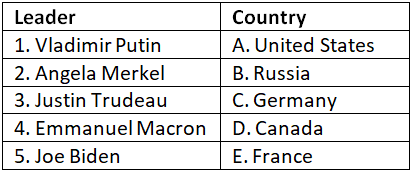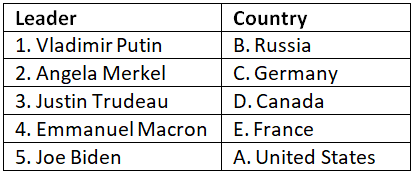Worksheet Solutions: Rulers of the World | General Knowledge Encyclopedia - Class 8 PDF Download
| Table of contents |

|
| Section A: Fill in the Blanks |

|
| Section B: Match the Column |

|
| Section C: True or False |

|
| Section D: Short Answer |

|
| Section E: Essay Question |

|
Section A: Fill in the Blanks
Q1: _______________ was the first President of the United States of America.
Ans: George Washington
Explanation: George Washington served as the first President of the United States from 1789 to 1797.
Q2: Nelson Mandela was a prominent leader in the struggle against _______________ in South Africa.
Ans: Apartheid
Explanation: Nelson Mandela fought against the system of racial segregation and discrimination in South Africa known as apartheid.
Q3: Mahatma Gandhi, known as the "Father of the Nation" in India, led the country's movement for _______________.
Ans: Independence
Explanation: Mahatma Gandhi led India's nonviolent struggle for independence against British colonial rule.
Q4: Queen Elizabeth II has been the monarch of the _______________ for over six decades.
Ans: United Kingdom
Explanation: Queen Elizabeth II has been the monarch of the United Kingdom since 1952.
Q5: Fidel Castro was a revolutionary leader who served as the Prime Minister and President of _______________.
Ans: Cuba
Explanation: Fidel Castro served as the Prime Minister and President of Cuba.
Section B: Match the Column

Ans:
Section C: True or False
Q1: Winston Churchill was the Prime Minister of the United Kingdom during World War II.
Ans: False.
Explanation: Winston Churchill was the Prime Minister of the United Kingdom, but he served during World War II. He took office on May 10, 1940, and remained Prime Minister until July 26, 1945. Churchill's leadership during World War II was instrumental in the UK's resistance against Nazi Germany.
Q2: Indira Gandhi was the first female Prime Minister of India.
Ans: False.
Explanation: Indira Gandhi was indeed the Prime Minister of India, but she was not the first female Prime Minister of the country. She was the third Prime Minister of India and served from 1966 to 1977 and then again from 1980 until her assassination in 1984. The first female Prime Minister of India was actually her father, Jawaharlal Nehru, who served as Prime Minister from 1947 to 1964.
Q3: Kim Jong-un is the current leader of South Korea.
Ans: False.
Explanation: As of my last update in September 2021, Kim Jong-un was the supreme leader of North Korea, not South Korea. He assumed office after the death of his father, Kim Jong-il, in December 2011. South Korea is a separate country with its own leadership.
Q4: Aung San Suu Kyi is a Nobel Peace Prize laureate and the leader of Myanmar.
Ans: True.
Explanation: Aung San Suu Kyi is a Nobel Peace Prize laureate and has been a prominent political figure in Myanmar (formerly known as Burma). She became the leader of the National League for Democracy (NLD) and played a significant role in Myanmar's transition to democracy. However, her leadership has been highly controversial, and she has faced criticism and condemnation for her handling of the Rohingya crisis and other human rights issues in the country.
Q5: Mao Zedong was the founder of the People's Republic of China.
Ans: True.
Explanation: Mao Zedong was the founder and the first Chairman of the People's Republic of China. He was a key figure in the Chinese Communist Party and led the party to victory in the Chinese Civil War. On October 1, 1949, Mao proclaimed the establishment of the People's Republic of China, and he remained the country's paramount leader until his death in 1976. Mao's policies and actions had a profound impact on China's history and society.
Section D: Short Answer
Q1: Who was the first female Prime Minister of the United Kingdom?
Ans: Margaret Thatcher
Q2: Name the leader who led the civil rights movement in the United States.
Ans: Martin Luther King Jr.
Q3: Which country was led by Nelson Mandela in his fight against apartheid?
Ans: South Africa
Q4: Who is the current President of France?
Ans: Emmanuel Macron
Q5: Name the leader who played a crucial role in the Cuban Revolution.
Ans: Fidel Castro
Section E: Essay Question
Explain the contributions and significance of Mahatma Gandhi in India's struggle for independence.
Ans: Encourage students to provide a comprehensive explanation of Mahatma Gandhi's contributions to India's struggle for independence, including his philosophy of nonviolence, civil disobedience campaigns, and impact on the Indian National Congress.
|
30 videos|108 docs|27 tests
|
FAQs on Worksheet Solutions: Rulers of the World - General Knowledge Encyclopedia - Class 8
| 1. Who were some of the most influential rulers in world history? |  |
| 2. What were the key characteristics of a successful ruler in ancient civilizations? |  |
| 3. How did the role of rulers change during the Renaissance period? |  |
| 4. What impact did imperialism have on the rulers of colonial empires? |  |
| 5. How did the role of rulers change during the Age of Enlightenment? |  |




















